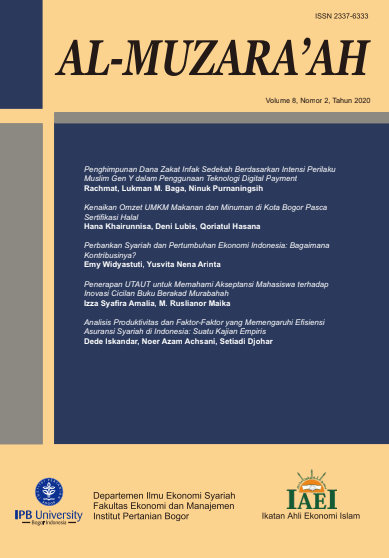Penerapan UTAUT untuk Memahami Akseptansi Mahasiswa terhadap Inovasi Cicilan Buku Berakad Murabahah
Main Article Content
Abstract
The increasing interest of the Muslim community in Indonesia in the consumption of goods and services labeled halal has certainly made all things with a halal perspective appear. Fintech (financial technology) as a form of digitization of the rapid development of technology is also used in the financial sector. The focus discussed in this study is the obligation of students to have books and how the website innovation system works using the murabaha contract. This study uses a phenomenological approach by conducting interviews with 40 students of the Muhammadiyah University of Sidoarjo who have used and made transactions on the IjabQabul.id website. The data obtained from the interviews were reprocessed using the Atlas.ti software. The results showed that from the IjabQabul.id website, students were quite helped by the facilities provided, such as payment methods that could be made online or collectively as well as payment methods that could be made in installments. Additions and feature enhancements are also expected by users to be added to the website.
Downloads
Article Details

This work is licensed under a Creative Commons Attribution-ShareAlike 4.0 International License.
Author(s) who published in this journal agree to following terms:
- Authors understand and agree that copyright of manuscripts published are held by Al-Muzara'ah. The statement to release the copyright to Al-Muzara'ah is stated in form CTA (link doc).
- Copyright encompass exclusive rights to reproduce, to distribute, and to sell any part of the journal articles in all form and media.
This work is licensed under a Creative Commons Attribution-ShareAlike 4.0 International License (CC BY-SA) where Authors and Readers can copy and redistribute the material in any medium or format, as well as remix, transform, and build upon the material for any purpose, but they must give appropriate credit (cite to the article or content), provide a link to the license, and indicate if changes were made. If you remix, transform, or build upon the material, you must distribute your contributions under the same license as the original.
References
Bonita, S. D. & Anwar, A. Z. (2018). Implementasi syariah compliance pada akad murabahah dan ijarah (studi kasus pada KSPPS BMT Fastabiq Jepara). JESI (Jurnal Ekonomi Syariah Indonesia), 7(2), 88-97.
Fauzan, A. (2011). Evaluasi Penerapan Metode Penentuan Harga Jual Beli Murabahah pada BMT Prima Syariah. (Skripsi, Universitas Islam Negeri Syarif Hidayatullah, Jakarta, Indonesia).
Hadad, M. D. (2017). Financial Technology (Fintech) di Indonesia. Kuliah Umum tentang Fintech, Indonesia Banking School.
Handayani, T. & Sudiana, S. (2015). Analisis penerapan model UTAUT (Unified Theory of Acceptance and Use of Technology) terhadap perilaku pengguna sistem informasi (studi kasus: sistem informasi akademik pada STTNAS Yogyakarta). Angkasa: Jurnal Ilmiah Bidang Teknologi, 7(2), 165-180.
Haryoso, L. (2017). Penerapan prinsip pembiayaan syariah (murabahah) pada BMT Bina Usaha di Kabupaten Semarang. Law and Justice, 2(1), 79-89.
Hiyanti, H., Nugroho, L., Sukmadilaga, C., & Fitrijanti, T. (2020). Peluang dan tantangan fintech (financial technology) syariah di Indonesia. Jurnal Ilmiah Ekonomi Islam, 5(3), 326-333.
Indah, M. & Agustin, H. (2019). Penerapan model UTAUT (Unified Theory of Acceptance and Use of Technology) untuk memahami niat dan perilaku aktual pengguna Go-Pay di Kota Padang. Jurnal Eksplorasi Akuntansi, 1(4), 1949-1967.
Kuswarno, E. (2009). Fenomenologi: Metode Penelitian Komunikasi: Konsepsi, Pedoman, dan Contoh Penelitiannya. Bandung (ID), Widya Padjadjaran.
Makkulau, A. R. & Abdullah, M. W. (2017). Penerapan prinsip syariah dalam akad pembiayaan murabahah pada Bank Muamalat. Jurnal Iqtisaduna, 3(1), 60-78.
Ningrum, D. A. (2019). Implementasi akuntansi pada akad piutang murabahah di KSPPS BMT Amanah Ummah Surabaya. Jurnal Ecopreneur.12, 2(1), 1-12.
Nirwandar, S. (2015, November). Halal lifestyle in Indonesia. In UNWTO Seminars–The Contribution of Islamic Culture and its Impact on the Asian Tourism Market. Brunei Darussalam.
[OJK] Otoritas Jasa Keuangan. (2020). Perusahaan Fintech Lending Berizin dan Terdaftar di OJK per 30 April 2020 [Internet]. [diunduh pada 2020 Sep 5]. Tersedia pada: https://www.ojk.go.id/id/berita-dan-kegiatan/publikasi/Documents/Pages/Penyelenggara-Fintech-Terdaftar-dan-Berizin-di-OJK-per-30-April-2020/161%20Penyelenggara%20LPMUBTI%20per%2030%20April%202020.pdf.
Oshlyansky, L., Cairns, P. & Thimbleby, H. (2007, September). Validating the Unified Theory of Acceptance and Use of Technology (UTAUT) tool cross-culturally. In Proceedings of HCI 2007 The 21st British HCI Group Annual Conference University of Lancaster, UK 21 (pp. 1-4).
Philippon, T. (2019). The fintech opportunity. The Disruptive Impact of FinTech on Retirement Systems, 190.
Prasetyo, D. Y. (2017). Penerapan metode UTAUT (Unified Theory of Acceptance and Use of Technology) dalam memahami penerimaan dan penggunaan website KKN LPPM UNISI. Sistemasi: Jurnal Sistem Informasi, 6(2), 26-34.
[PRC] Pew Research Centre. (2020). Muslim Population by Country [Internet]. [diunduh pada 2020 Sep 5]. Tersedia pada: http://www.globalreligiousfutures.org/religions/muslims.
Rizal, M., Maulina, E. & Kostini, N. (2019). Fintech sebagai salah satu solusi pembiayaan bagi UMKM. AdBispreneur: Jurnal Pemikiran dan Penelitian Administrasi Bisnis dan Kewirausahaan, 3(2), 89-100.
Rizky, M. N. F. P. (2019). Analisis Kesesuaian Praktik Pembiayaan Murabahah Berbasis Fintech Syariah di Syarq.com dengan Fatwa DSN No: 117/DSN-MUI/II/2018. (Skripsi, Universitas Islam Indonesia, Yogyakarta, Indonesia).
Setiani, D. D., Nivanty, H., Lutfiah, W., & Rahmawati, L. (2020). Fintech syariah: manfaat dan problematika penerapan pada UMKM. Jurnal Masharif al-Syariah: Jurnal Ekonomi dan Perbankan Syariah, 5(1).
Sugiarti, E. N., Diana, N., & Mawardi, M. C. (2019). Peran fintech dalam meningkatkan literasi keuangan pada Usaha Mikro Kecil Menengah di Malang. Jurnal Ilmiah Riset Akuntansi, 8(04).
Sugiyono. (2019). Metode Penelitian Kuantitatif, Kualitatif, dan R&D-MPKK. Bandung (ID), CV. Alfabeta.
Venkatesh, V., Morris, M. G., Davis, G. B., & Davis, F. D. (2003). User acceptance of information technology: Toward a unified view. MIS quarterly, 425-478.
Wahyuni, R. A. E. (2019). Perkembangan ekonomi Islam di Indonesia melalui penyelenggaraan fintech syariah. Mahkamah: Jurnal Kajian Hukum Islam, 4(2), 184-192.
Wazin, W. (2014). Murabahah dalam hukum positif dan implementasi pada praktek pembiayaan konsumen. ISLAMICONOMIC: Jurnal Ekonomi Islam, 5(1).

